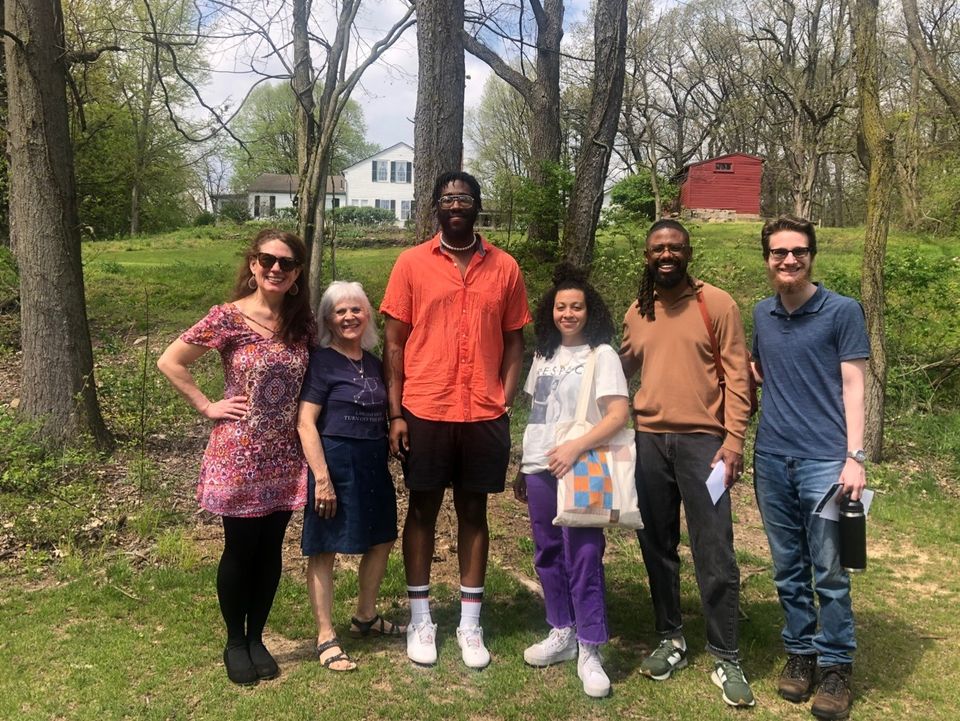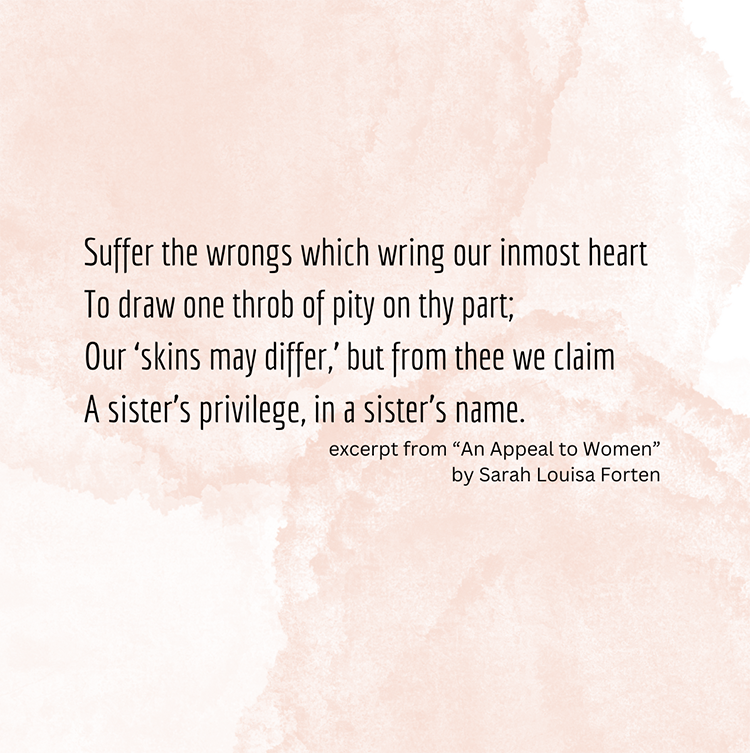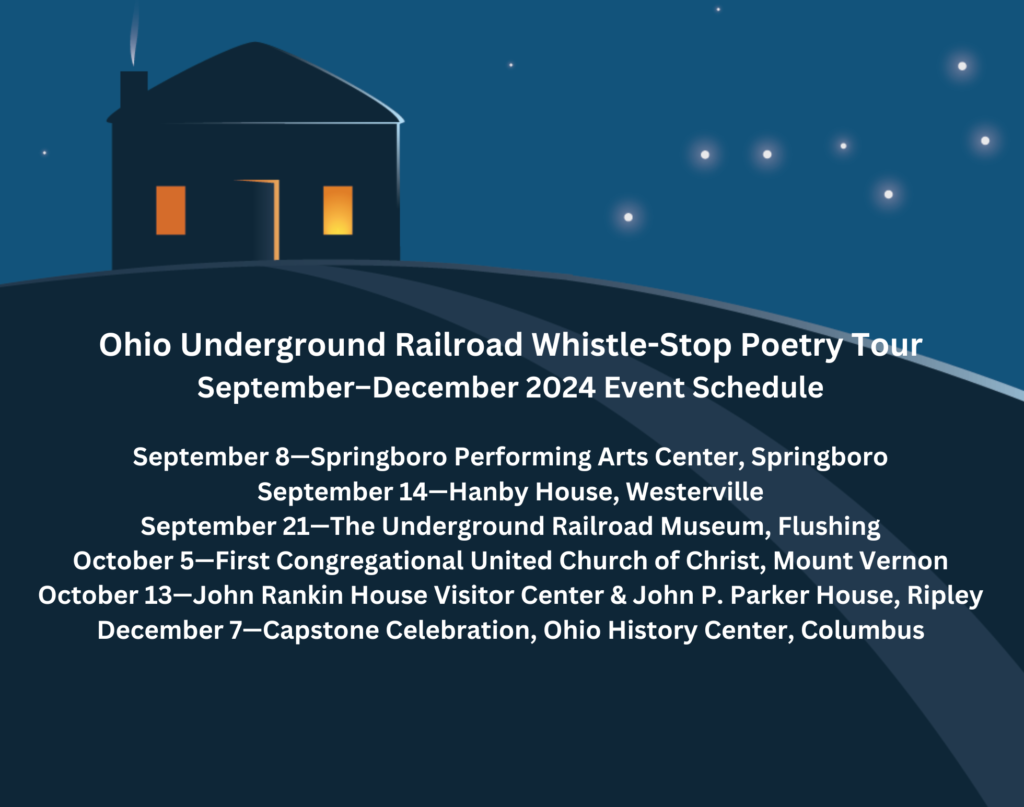Pursuing the Unifying Spirit Behind the Underground Railroad Through Poetry
By Debbie Allen, Poets Against Racism & Hate USA Cofounder and Ohio Underground Railroad Whistle-Stop Poetry Tour Project Director

A museum just steps from the banks of the Ohio River, “Jordan” as it was known in coded slave spirituals. A library on the shores of Lake Erie, where passage to Canada brought a new life. The dairy barn of a farm owned by abolitionists who routinely opened their home, and hearts, to freedom seekers. The lush gardens of a Victorian Era home in which two young girls escaping the horrors of slavery and making their way north alone found safe harbor. In poignant spaces such as these, poets involved in the Ohio Underground Railroad Whistle-Stop Poetry Tour enlighten and inspire audiences with historic and contemporary poems focused on issues of social justice.
The Ohio Poetry Association and Poets Against Racism & Hate USA are collaborating throughout this year to present the Ohio Underground Railroad Whistle-Stop Poetry Tour, a project funded in part by the America 250-Ohio Commission and made possible in part by an investment of public funds from the Ohio Arts Council. The tour combines history presentations and poetry readings to honor Ohio’s role in the Underground Railroad and raise awareness of persisting issues of injustice, hate, and prejudice. Lectures by local historians, walking tours, and museum exhibits deliver rich detail about ways in which Ohioans aided enslaved African Americans in their self-emancipation. As indicated in the opening paragraph, the venues themselves also contribute meaning to the tour. But the emotional high point at each stop is the poetry. Poets from around the state enthrall audiences with works of witness by slavery-era poets such as Elizabeth Margaret Chandler, David Drake, Sarah Louisa Forten, Francis Ellen Watkins Harper, and John Greenleaf Whittier and
with their own heartfelt poems that spring from lived experiences and intense interest in allyship.

Those involved in the Underground Railroad and many others were on the altruistic side of history before and during the Civil War. Such dedication continued through the reconstruction and civil rights eras that followed. However, we now live in a time when that deep concern for others known as altruism seems to be flagging. Structural racism persists, and if some have their way, will be bolstered versus dismantled as time goes on. The unifying spirit behind the Underground Railroad is what the Ohio Poetry Association and Poets Against Racism & Hate USA hope to pursue and promote through the activities and readings provided via the Ohio Underground Railroad Whistle-Stop Poetry Tour.
The power of the tour is evident from the feedback offered by those in attendance. Events have garnered praise from audience members moved by the “great power” and “layers of brutality and beauty” in the readings. Press coverage has mentioned the “passionate voices” of the poets and “warm and welcoming environment” of the events. Participating poet Chanda Feldman summed up the impacts of the tour best in a quote in The Oberlin Review following an early May tour event in Oberlin: “Poetry is a form of activism,” Feldman said. “It has the opportunity to reach into people’s hearts, challenge them, and make them think further about some of the notions that we take for granted and push us to really ask ourselves, how else can we see this? What other questions can we ask that we haven’t asked before?”
You can experience the power of the Ohio Underground Railroad Whistle-Stop Poetry Tour for yourself! With five tour stops at locales around the state and a Capstone Celebration in Columbus yet to come, you’re sure to find an event that fits your schedule. And the array of activities at each event and historical significance of each venue make the tour worth a road trip if there’s not a stop near you! For details visit the event-specific pages on the Ohio Poetry Association and Poets Against Racism & Hate USA websites. Then make your plan to take part in this exploration of Ohio’s history and examination of current challenges through the compelling lens that is poetry.

Sources:
- National Park Service. “Underground Railroad: Journey to Freedom.” https://www.nps.gov/subjects/undergroundrailroad/index.htm
- Schulz, Kathy. The Underground Railroad in Ohio. The History Press, 2023.
Any views, findings, conclusions, or recommendations expressed in this article or during the Ohio Underground Railroad Whistle-Stop Poetry Tour do not necessarily represent those of the America 250-Ohio Commission.